Immunologist shares takeaways from incessant battleground
Friday, October 21, 2022
A self-described "nerdy immunologist" visited Pennsylvania College of Technology on Wednesday, distilling his career-amassed expertise – from personal research into tuberculosis to broader humanity's experience with the COVID pandemic – for a lay audience's better understanding of the triumphs and failures of fighting pathogenic illness.
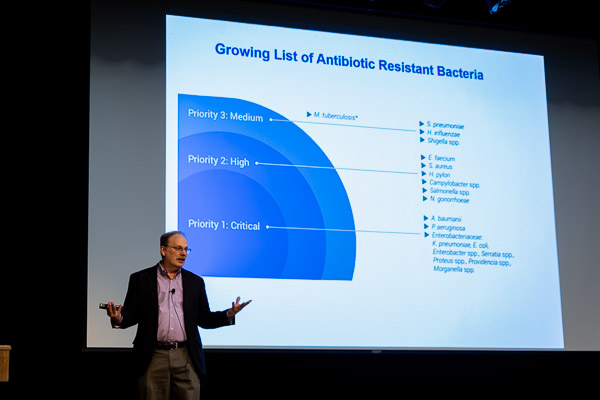 Jeff Schorey, the George B. Craig Jr. Collegiate Professor of Biological Sciences at the University of Notre Dame and a guest lecturer with the university’s Hesburgh Lecture Series, presented “Our Never-Ending Battle Against Infectious Diseases: The Winners, the Losers and Where We Go from Here” as part of the college's Technology & Society Colloquia Series.
Jeff Schorey, the George B. Craig Jr. Collegiate Professor of Biological Sciences at the University of Notre Dame and a guest lecturer with the university’s Hesburgh Lecture Series, presented “Our Never-Ending Battle Against Infectious Diseases: The Winners, the Losers and Where We Go from Here” as part of the college's Technology & Society Colloquia Series.
The hourlong presentation, in the Klump Academic Center Auditorium, was presented in partnership with the Notre Dame Club of Greater Williamsport.
With a range of enlightening anecdotes and illustrated examples – including a practical analogy, courtesy of his son, likening an amusement park "fast pass" to the prioritizing of vaccine development – Schorey engagingly covered such topics as the human immune system, antibiotic resistance, delivering diagnostics to remote corners of the world "where there's not a Walmart or CVS," and lessons learned from researchers' eternal struggle.
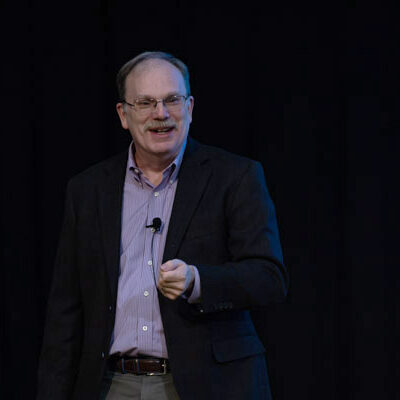 Among his insights:
Among his insights:
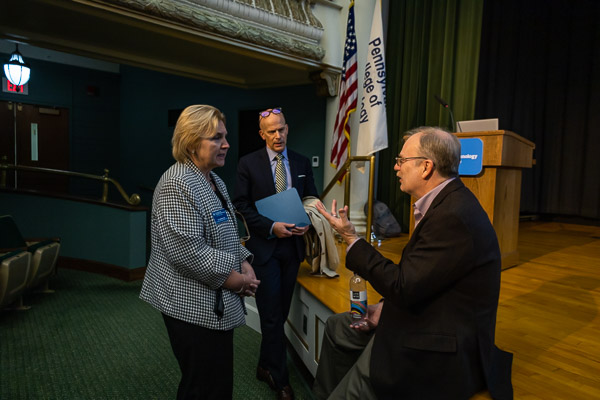 The Hesburgh Lecture Series – named in honor of the Rev. Theodore Hesburgh, the university’s longtime president, and featuring lectures mostly presented by tenured faculty – showcases the depth and breadth of Notre Dame’s academic expertise in research and teaching.
The Hesburgh Lecture Series – named in honor of the Rev. Theodore Hesburgh, the university’s longtime president, and featuring lectures mostly presented by tenured faculty – showcases the depth and breadth of Notre Dame’s academic expertise in research and teaching.
The Technology & Society Colloquia Series at Penn College honors Daniel J. Doyle, professor emeritus and the college’s 1984 Veronica M. Muzic Master Teacher Award winner. It features presentations by noted authors and academics and challenges audiences to consider the impact of technology on our society.
Schorey's lecture was followed by a reception, where attendees could ask further questions of the speaker.
 Jeff Schorey, the George B. Craig Jr. Collegiate Professor of Biological Sciences at the University of Notre Dame and a guest lecturer with the university’s Hesburgh Lecture Series, presented “Our Never-Ending Battle Against Infectious Diseases: The Winners, the Losers and Where We Go from Here” as part of the college's Technology & Society Colloquia Series.
Jeff Schorey, the George B. Craig Jr. Collegiate Professor of Biological Sciences at the University of Notre Dame and a guest lecturer with the university’s Hesburgh Lecture Series, presented “Our Never-Ending Battle Against Infectious Diseases: The Winners, the Losers and Where We Go from Here” as part of the college's Technology & Society Colloquia Series.The hourlong presentation, in the Klump Academic Center Auditorium, was presented in partnership with the Notre Dame Club of Greater Williamsport.
With a range of enlightening anecdotes and illustrated examples – including a practical analogy, courtesy of his son, likening an amusement park "fast pass" to the prioritizing of vaccine development – Schorey engagingly covered such topics as the human immune system, antibiotic resistance, delivering diagnostics to remote corners of the world "where there's not a Walmart or CVS," and lessons learned from researchers' eternal struggle.
 Among his insights:
Among his insights:- Laboratory study: "I'm a basic researcher, so I think basic research is very important. I think for us to develop these new vaccines, these new drug targets, these new diagnostic tools, you need that basic research that gives us the understanding of the pathogenicity of the organism."
- Private-sector participation: "We need financial support from government and NGOs. If we put our mind to it, we can do it ... but in order to put our mind to it, we need to have industry buy into this thing. I constantly have this issue with industry in the sense that TB is not a disease in the developed world. It's a disease of low- and middle-income countries, so there's not a lot of financial gain from developing new vaccines. The financial aspect of it is reliant on government and NGOs, which cannot support it as much as industry could if they put their minds to it."
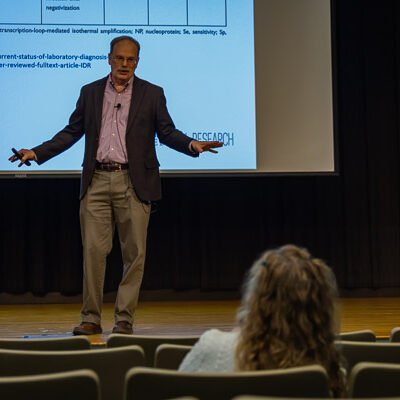 Diligence: "We need more effort and resources put into surveillance. This is a lesson learned not just from SARS-COVID, but from many of these infections. If we catch them early, they're much easier to control, right? If you let 'em get out, especially if they're contagious so they're passed from person to person ... when you have a million people infected, it's really hard to control. Catching it early requires the surveillance and that requires good diagnostics. It's critical."
Diligence: "We need more effort and resources put into surveillance. This is a lesson learned not just from SARS-COVID, but from many of these infections. If we catch them early, they're much easier to control, right? If you let 'em get out, especially if they're contagious so they're passed from person to person ... when you have a million people infected, it's really hard to control. Catching it early requires the surveillance and that requires good diagnostics. It's critical."- Better communication is needed between such organizations as the World Health Organization and the Centers for Disease Control. "SARS is a good example of that. We could have done a better job."
- Support of the population: "You know you're gonna have to have an educated population. People understand the importance of diagnostics and people understand the importance of vaccines and the importance of funding. This type of work, if we did it then, I think it would go a long ways toward control.
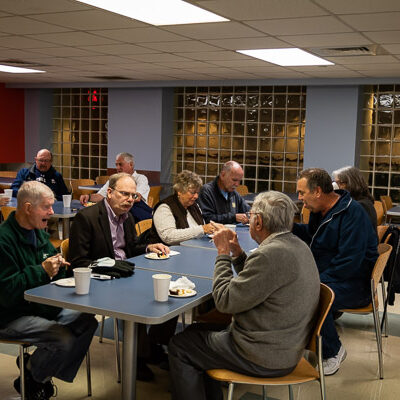 Societal focus: And then we just need the collective will power to succeed. We need people like us to go out there and say, 'You know, this is important stuff. We don't know what the next pandemic will be."
Societal focus: And then we just need the collective will power to succeed. We need people like us to go out there and say, 'You know, this is important stuff. We don't know what the next pandemic will be."
 The Hesburgh Lecture Series – named in honor of the Rev. Theodore Hesburgh, the university’s longtime president, and featuring lectures mostly presented by tenured faculty – showcases the depth and breadth of Notre Dame’s academic expertise in research and teaching.
The Hesburgh Lecture Series – named in honor of the Rev. Theodore Hesburgh, the university’s longtime president, and featuring lectures mostly presented by tenured faculty – showcases the depth and breadth of Notre Dame’s academic expertise in research and teaching.The Technology & Society Colloquia Series at Penn College honors Daniel J. Doyle, professor emeritus and the college’s 1984 Veronica M. Muzic Master Teacher Award winner. It features presentations by noted authors and academics and challenges audiences to consider the impact of technology on our society.
Schorey's lecture was followed by a reception, where attendees could ask further questions of the speaker.
Photos by Frank T. Kocsis III, student photographer


